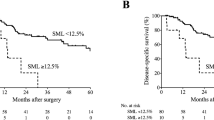Abstract
Undernutrition and sarcopenia are associated with a higher incidence of chemotherapy-related toxicity and a poor prognosis in several kinds of cancer, but the impact of sarcopenia on the outcomes of chemotherapy for esophageal cancer remains unclear. Thus, the purpose of this retrospective study was to investigate whether sarcopenia affects the efficacy and toxicities of chemotherapy for advanced esophageal cancer patients. Data were collected from 31 esophageal cancer patients who underwent neo-adjuvant chemotherapy followed by surgery. Body composition was assessed at the start of chemotherapy by bioelectrical impedance analysis, and outcomes of chemotherapy were compared between sarcopenic and non-sarcopenic groups. Of the 31 patients, sarcopenia was observed in 16 (51.6%). The incidence of toxicities was not different between the two groups. However, as for pathologic response, a good therapeutic effect (Grade 2 or higher) was more common in the non-sarcopenic group than in the sarcopenic group (53.3% vs. 25.0%). Multivariate analysis showed that sarcopenia was an independent predictor of poor pathological response (odds ratio 8.02; P = 0.037). The results of this study suggest the potential utility of sarcopenia assessment in neoadjuvant patient selection strategies.

Similar content being viewed by others
References
Enzinger PC, Mayer RJ. Esophageal cancer. N Engl J Med. 2003;349:2241–52.
Gertler R, Stein HJ, Langer R. Long-term outcome of 2920 patients with cancers of the esophagus and esophagogastric junction: evaluation of the New Union Internationale Contre le Cancer/American Joint Cancer Committee staging system. Ann Surg. 2011;253:689–98.
Cruz-Jentoft AJ, Baeyens JP, Bauer JM. Sarcopenia: European consensus on definition and diagnosis: Report of the European Working Group on Sarcopenia in Older People. Age Ageing. 2010;39:412–23.
Montano-Loza AJ, Meza-Junco J, Prado CM. Muscle wasting is associated with mortality in patients with cirrhosis. Clin Gastroenterol Hepatol 2012;10:166–73, 173.e1.
Fearon K, Arends J, Baracos V. Understanding the mechanisms and treatment options in cancer cachexia. Nat Rev Clin Oncol. 2013;10:90–9.
Prado CM, Lieffers JR, McCargar LJ. Prevalence and clinical implications of sarcopenic obesity in patients with solid tumours of the respiratory and gastrointestinal tracts: a population-based study. Lancet Oncol. 2008;9:629–35.
Tan BH, Birdsell LA, Martin L. Sarcopenia in an overweight or obese patient is an adverse prognostic factor in pancreatic cancer. Clin Cancer Res. 2009;15:6973–9.
Sabel MS, Lee J, Cai S. Sarcopenia as a prognostic factor among patients with stage III melanoma. Ann Surg Oncol. 2011;18:3579–85.
van Vledder MG, Levolger S, Ayez N. Body composition and outcome in patients undergoing resection of colorectal liver metastases. Br J Surg. 2012;99:550–7.
Awad S, Tan BH, Cui H. Marked changes in body composition following neoadjuvant chemotherapy for oesophagogastric cancer. Clin Nutr. 2012;31:74–7.
Anandavadivelan P, Brismar TB, Nilsson M. Sarcopenic obesity: a probable risk factor for dose limiting toxicity during neo-adjuvant chemotherapy in oesophageal cancer patients. Clin Nutr. 2015. https://doi.org/10.1016/j.clnu.2015.05.011.
Tan BH, Brammer K, Randhawa N. Sarcopenia is associated with toxicity in patients undergoing neo-adjuvant chemotherapy for oesophago-gastric cancer. Eur J Surg Oncol. 2015;41:333–8.
Yip C, Goh V, Davies A. Assessment of sarcopenia and changes in body composition after neoadjuvant chemotherapy and associations with clinical outcomes in oesophageal cancer. Eur Radiol. 2014;24:998–1005.
Harada K, Ida S, Baba Y. Prognostic and clinical impact of sarcopenia in esophageal squamous cell carcinoma. Dis Esophagus 2015. https://doi.org/10.1111/dote.12381.
Ishikawa T, Yasuda T, Doi T. The amino acid-rich elemental diet Elental(R) preserves lean body mass during chemo- or chemoradiotherapy for esophageal cancer. Oncol Rep. 2016;36:1093–100.
Murimwa GZ, Venkat PS, Jin W. Impact of sarcopenia on outcomes of locally advanced esophageal cancer patients treated with neoadjuvant chemoradiation followed by surgery. J Gastrointest Oncol. 2017;8:808–15.
Järvinen T, Ilonen I, Kauppi J. Loss of skeletal muscle mass during neoadjuvant treatments correlates with worse prognosis in esophageal cancer: a retrospective cohort study. World J Surg Oncol. 2018. https://doi.org/10.1186/s12957-018-1327-4.
Ida S, Watanabe M, Karashima R. Changes in body composition secondary to neoadjuvant chemotherapy for advanced esophageal cancer are related to the occurrence of postoperative complications after esophagectomy. Ann Surg Oncol. 2014;21:3675–9.
Siegal SR, Dolan JP, Dewey EN. Sarcopenia is not associated with morbidity, mortality, or recurrence after esophagectomy for cancer. Am J Surg. 2018. https://doi.org/10.1016/j.amjsurg.2017.12.017.
Makiura D, Ono R, Inoue J. Impact of sarcopenia on unplanned readmission and survival after esophagectomy in patients with esophageal cancer. Ann Surg Oncol. 2018;25:456–64.
Chen LK, Liu LK, Woo J. Sarcopenia in Asia: consensus report of the Asian Working Group for Sarcopenia. J Am Med Dir Assoc. 2014;15:95–101.
Proctor MJ, Morrison DS, Talwar D. An inflammation-based prognostic score (mGPS) predicts cancer survival independent of tumour site: a Glasgow Inflammation Outcome Study. Br J Cancer. 2011;104:726–34.
Japan Esophageal Society. Japanese classification of esophageal cancer: Part I: esophagus, 11th ed., vol 14; 2017, 1–36.
Antoun S, Lanoy E, Iacovelli R. Skeletal muscle density predicts prognosis in patients with metastatic renal cell carcinoma treated with targeted therapies. Cancer. 2013;119:3377–84.
Iritani S, Imai K, Takai K. Skeletal muscle depletion is an independent prognostic factor for hepatocellular carcinoma. J Gastroenterol. 2015;50:323–32.
Barret M, Antoun S, Dalban C. Sarcopenia is linked to treatment toxicity in patients with metastatic colorectal cancer. Nutr Cancer. 2014;66:583–9.
Prado CM, Baracos VE, McCargar LJ. Sarcopenia as a determinant of chemotherapy toxicity and time to tumor progression in metastatic breast cancer patients receiving capecitabine treatment. Clin Cancer Res. 2009;15:2920–6.
Funding
This work was supported by the Grant-in-Aid for Scientific Research (KAKENHI C) (16K09274) from the Japan Society for the Promotion of Science (JSPS).
Author information
Authors and Affiliations
Corresponding author
Ethics declarations
Conflict of interest
The authors declare that they have no conflict of interest.
Rights and permissions
About this article
Cite this article
Ota, T., Ishikawa, T., Endo, Y. et al. Skeletal muscle mass as a predictor of the response to neo-adjuvant chemotherapy in locally advanced esophageal cancer. Med Oncol 36, 15 (2019). https://doi.org/10.1007/s12032-018-1242-0
Received:
Accepted:
Published:
DOI: https://doi.org/10.1007/s12032-018-1242-0




